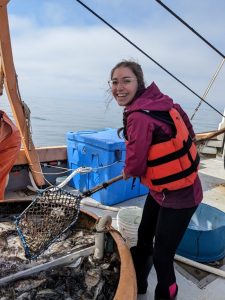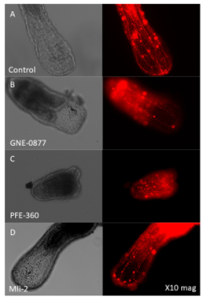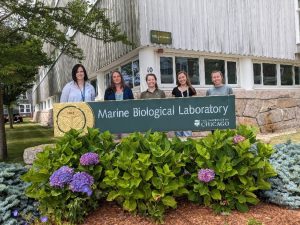21 September 2023

To develop her own understanding of tissue regeneration, Grace Holmes, a master’s student from the Royal Veterinary College, used a Travelling Fellowship from Development to visit the Echeverri lab at the Marine Biological Laboratory in Woods Hole, Massachusetts. There, she explored the role of Leucine Rich Repeat Kinase 2 (LRRK2), a protein associated with Parkinson’s disease in humans, in regeneration.
The Echeverri lab is interested in the evolution of regenerative mechanisms, and their recent work on spinal cord regeneration in the axolotl was recently published in Development. The group also use Nematostella vectensis, a species of small sea anemone which is native to the east coast of the United States and has an orthologue of the human LRRK2 gene (nvLRRK).

Whilst investigating the Nematostella model, Grace used in situ hybridisation, to determine the localisation of the nvLRRK2 mRNA. Grace also wanted to investigate the effect of perturbing nvLRRK2 activity and she had the chance to use CRISPR-Cas9 technology to knockdown the nvLRRK2 gene. However, she found that the use of LRRK2 kinase inhibitors, namely MLi-2, GNE-0877 and PFE-360, was a more effective approach. These inhibitors have been developed to reduce the increased kinase activity exhibited in patients with Parkinson’s disease.
Having successfully inhibited nvLRRK2 activity, Grace was able to explore the effect of this on Nematostella growth and regeneration. She used transgenic animals expressing fluorescent proteins that helped visualise five neuronal subtypes. By measuring the differences in the morphology of the Nematostella, Grace could begin to quantify the level of growth and repair using light microscopy and statistical analysis. Using fluorescence microscopy, Grace could assess the effect of nvLRRK2 inhibition on the neurons by comparing the nerve nets (the nervous system morphology of Nematostella) of those in the experimental groups with the controls.

The results from these experiments allowed Grace to conclude that the Nematostella LRRK2 orthologue does indeed influence the level of regeneration observed in Nematostella and may have a role in neurogenesis.
“As most of my undergraduate degree was affected by Covid, I am grateful for the in-person lab experience, which will have a positive impact on my career opportunities further down the line. Looking beyond the science, I have left Woods Hole with lots of fond memories of social events, visiting a vineyard, swimming in the sea and enjoying a boat ride to collect sea animals used for research purposes”, Grace said.
Overall, the Travelling Fellowship from Development provided an invaluable opportunity for Grace to acquire new skills, collaborate with fellow students and contribute significantly to both her master’s project and personal growth. This immersive experience expanded Grace’s knowledge and equipped her with innovative techniques that will continue to facilitate her career path.








You must be logged in to post a comment.